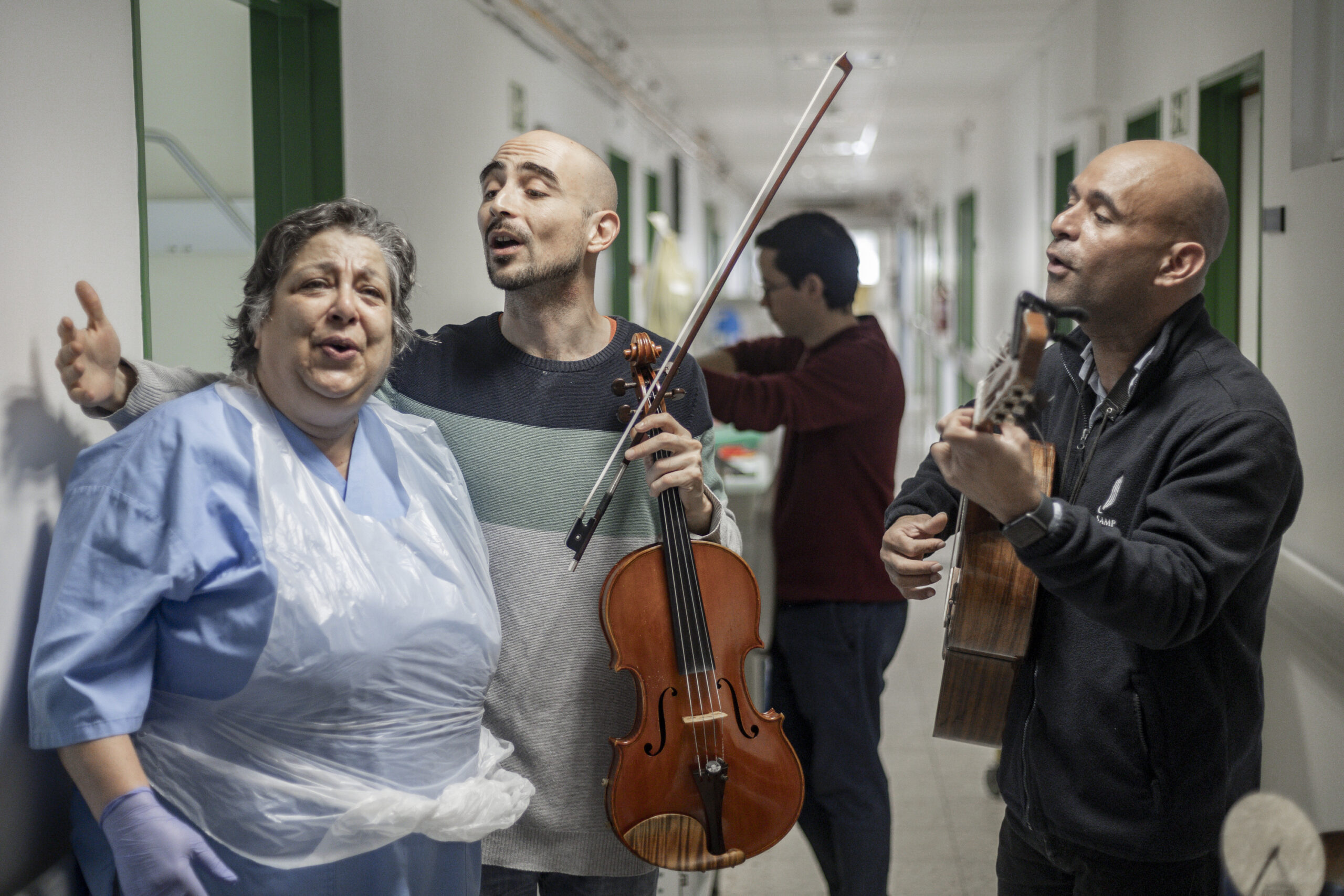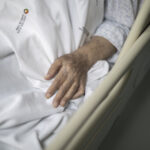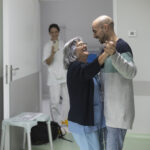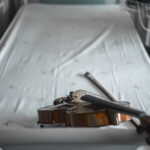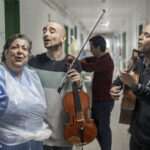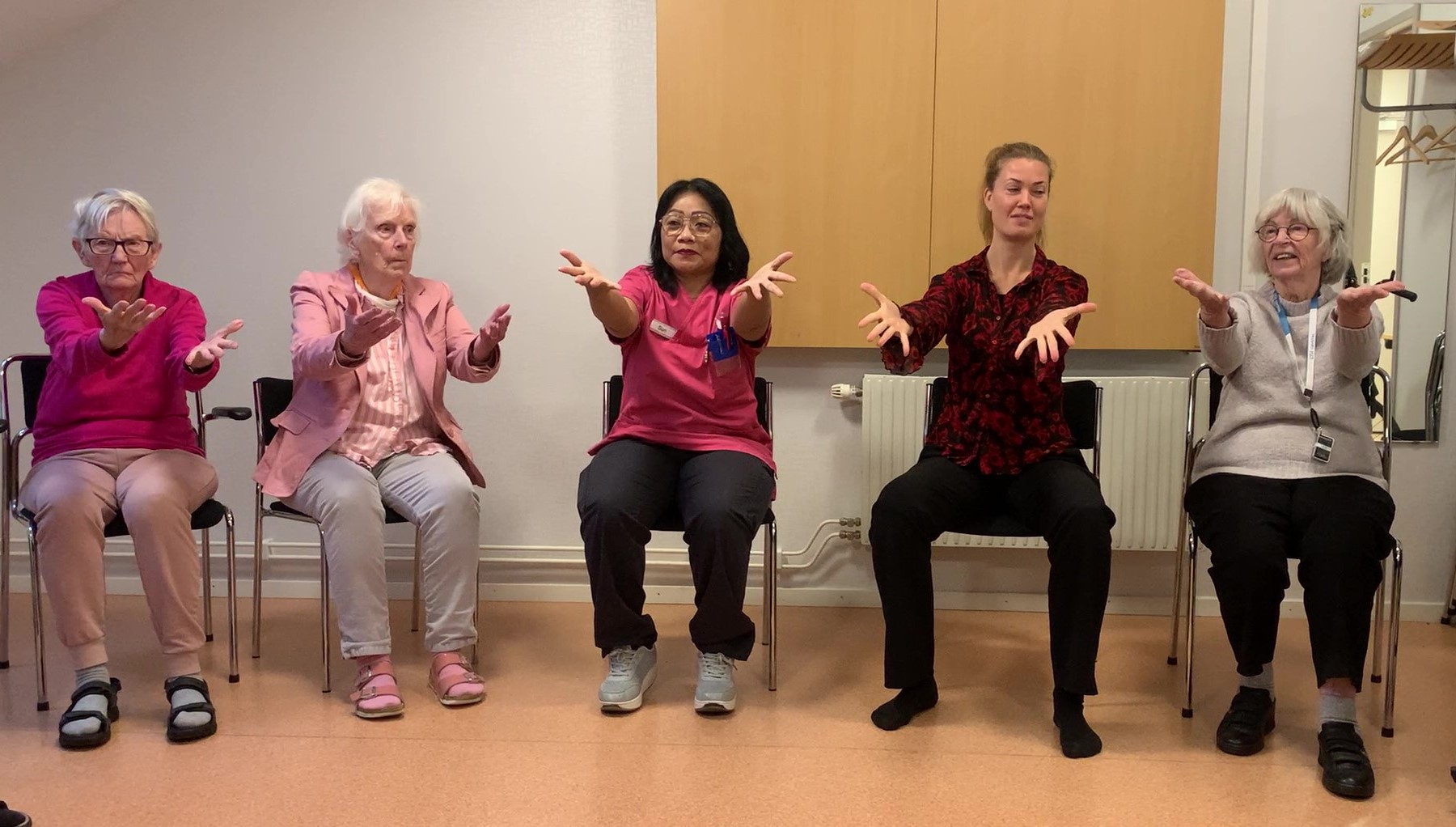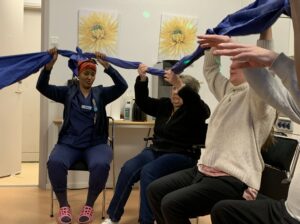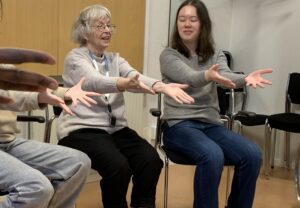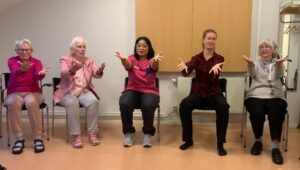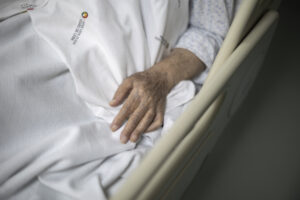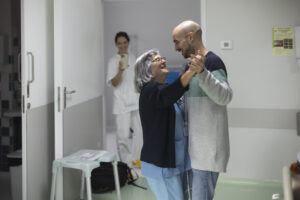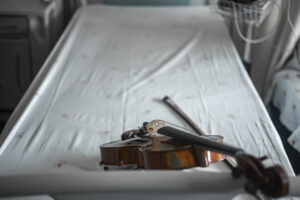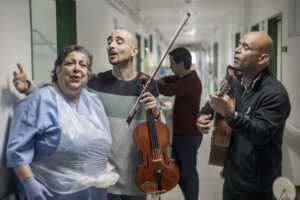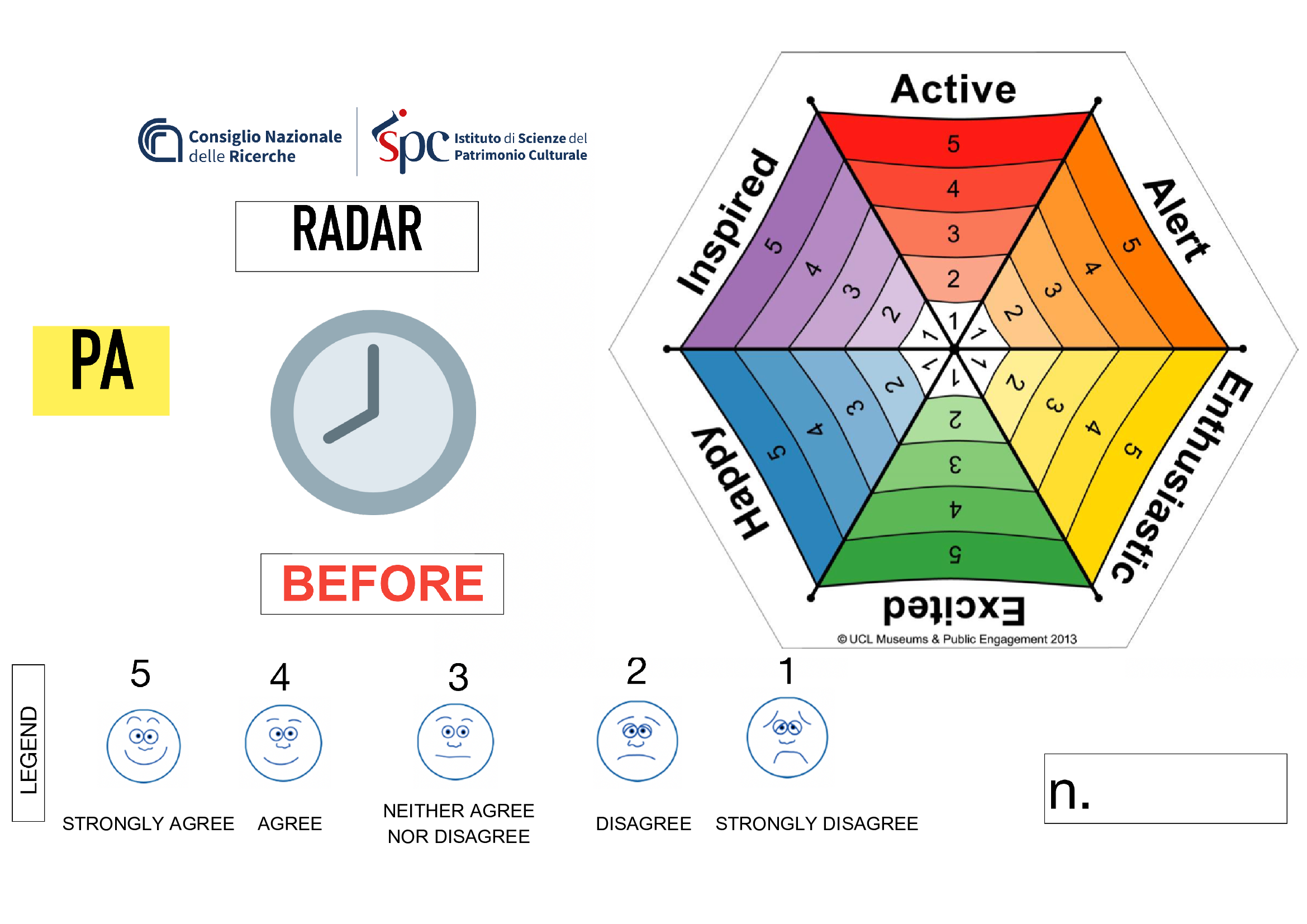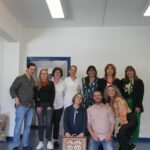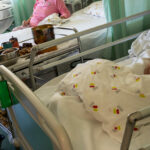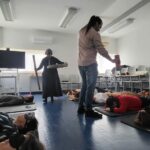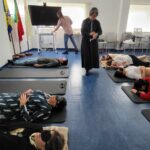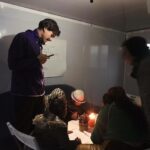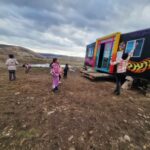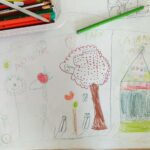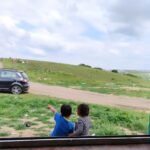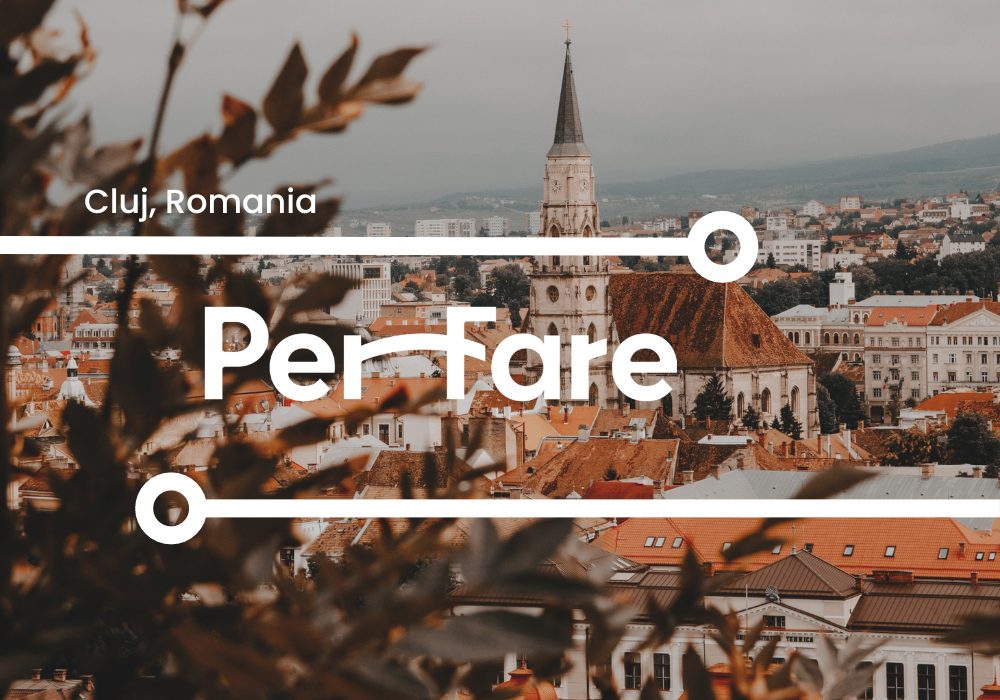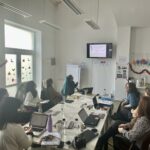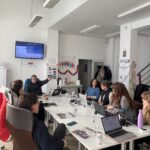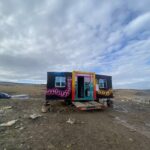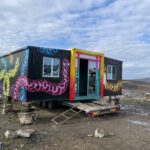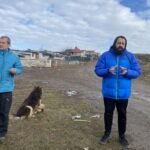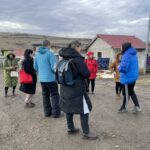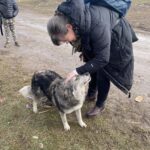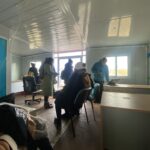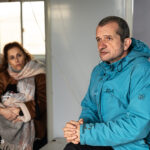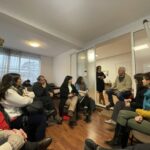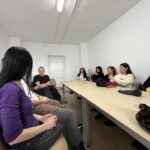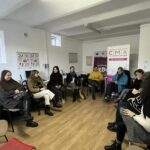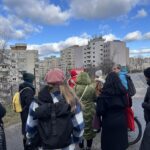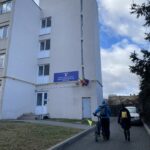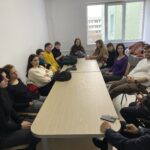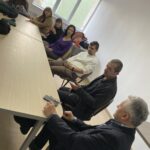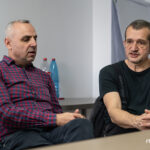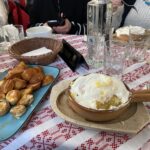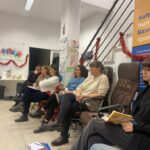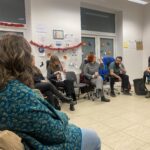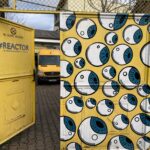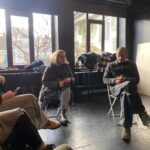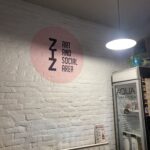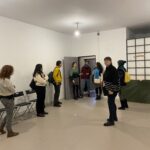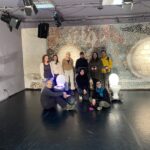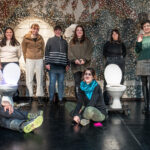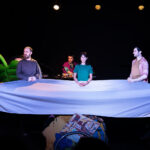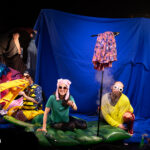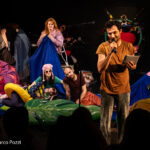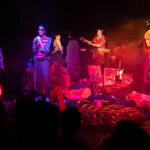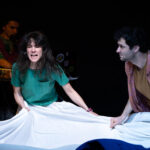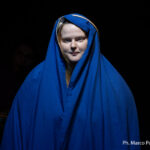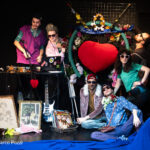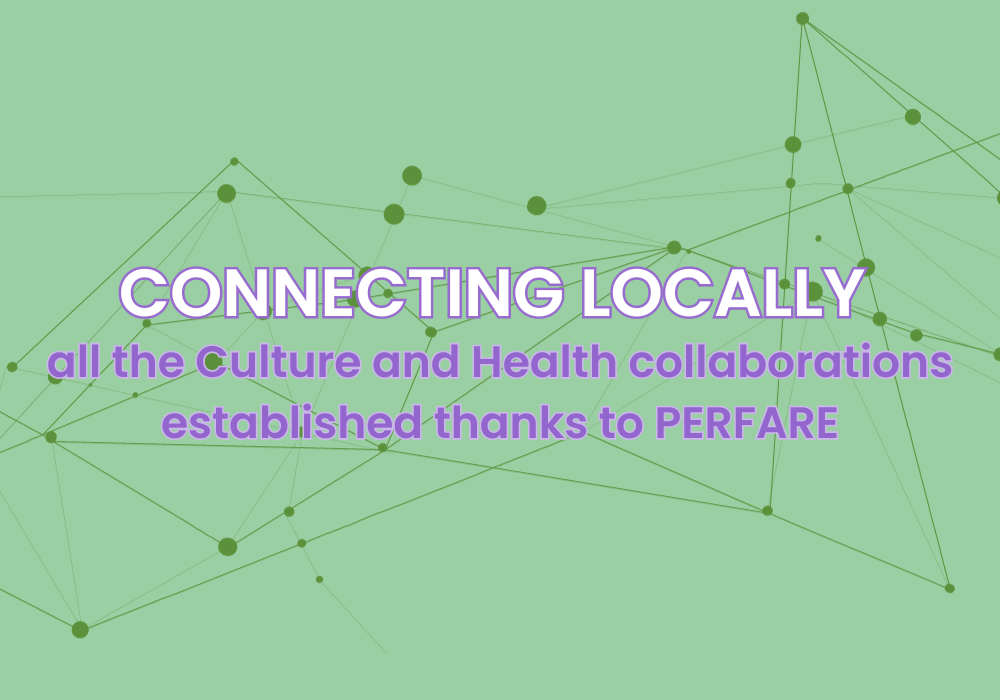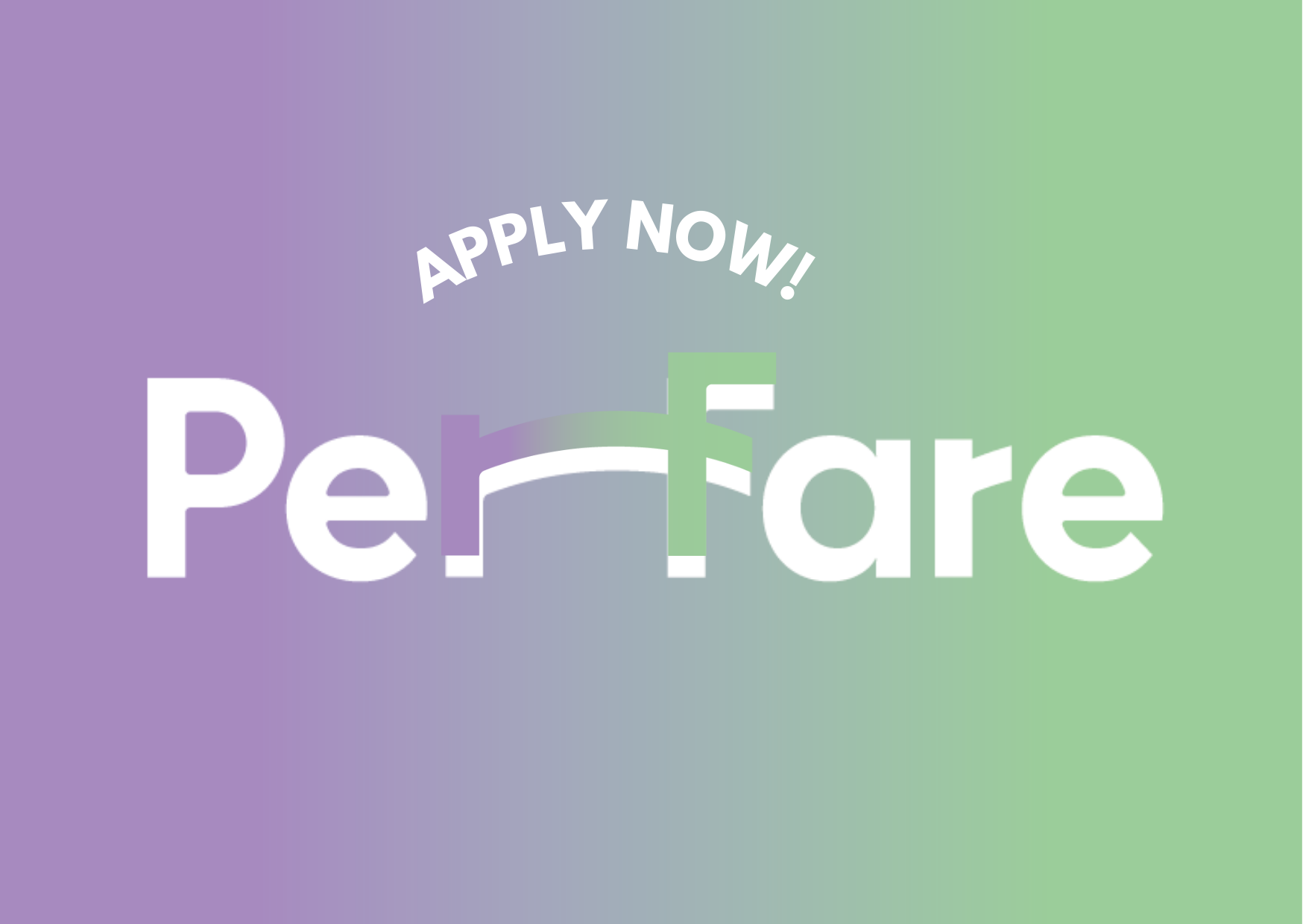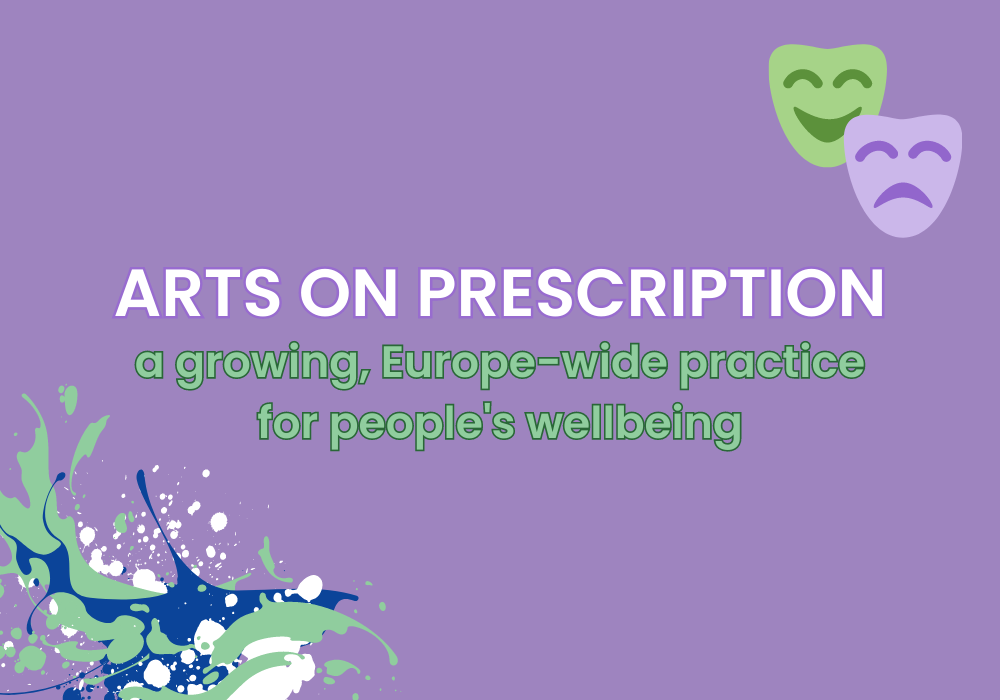News from Portugal: PerFare influences the wellbeing of social and health workers too
The project Aqui contigo – Sound as Last Lap by SAMP, taking place in Pombal (Portugal) has gathered some very interesting feedback. The pilot action impacts not only the direct beneficiaries of the artistic intervention, in this case being the patients of the Pombal District Hospital, but also the health and social professionals taking care of them and, in general, the whole hospital atmosphere.
As a matter of fact, the positive outcome is clearly visible after the first months: people in chronic conditions are able to relieve somatic pain thanks to music, while professionals are stating that the project helped to soften the constant daily pressure and favored a sense of well-being in the work environment.
Here is a statement from Alexandra Teixeira, Specialist Nurse and member of the Humanization Committee:
The project Aqui Contigo (Here With You), developed by SAMP at Pombal District Hospital, represents a transformative encounter between music and healthcare. This initiative transcended the conventional hospital environment and created a space for humanisation, welcome and connection through musical art.
We believe that the impact on the patients was profound and heart-warming. Music proved to be a powerful vehicle for emotional relief, easing tensions and anxieties associated with the hospital environment. Many described feelings of calm, comfort and even joy, even during challenging times such as hospitalisation. Music helped transform hospital rooms into spaces of serenity, where emotions could be experienced more lightly and less seriously.
For the professionals, the music helped to soften the constant daily pressure and favoured a sense of well-being in the work environment. In addition, we believe that it brought the professionals closer to the human dimension of the patients and strengthened the bond, promoting greater empathy and sensitivity in care.
Being able to take part in this project has contributed to a deeper understanding of the direct impact of music in hospital environments. We realised how sounds and musical harmony can create bridge between art and medicine, promoting a holistic approach to care.
Being able to take part in this project has contributed to a deeper understanding of the direct impact of music in hospital environments. We realised how sounds and musical harmony can create bridges between art and medicine, promoting a holistic approach to care.
One of the main challenges was to somehow change mentalities. Adapting the presence of music to an environment as sensitive and dynamic as a hospital can seem like a difficult task, and it’s necessary to balance the intensity of the musical interventions with the patients’ routines and rest. This was overcome after the first week of the project. The professionalism and sensitivity of the SAMP musicians clearly contributed to its acceptance.
The adaptation of repertoires to the hospital context combined with the empathy and emotion in each intervention made Aqui Contigo (Here With You) the highlight and most eagerly awaited moment of the week.
For the future, we hope that Aqui Contigo (Here With You) can expand its reach, both in terms of the number of beneficiaries and the area it covers. We believe in an even greater partnership between music and therapeutic practices, with the development of protocols that value art as an integral part of holistic healthcare, inspiring other institutions to embrace this initiative as an essential tool for humanisation.
Finally, we hope that Aqui Contigo (Here With You) continues to touch lives, chanting hope and well-being wherever music finds a heart that needs to hear it.
Keep following us on Facebook, Instagram and Vimeo.
Subscribe to our newsletter to receive all the updates on PERFARE and its journey directly on your emails.
PILOT ACTIONS: Culture&Health Projects from Malmö and Macerata
PerFare's pilot actions are starting to roll now: some have been going on for weeks already and some others are just starting, but in every PerFare country there is a little seed planted.
Two new projects have joined the curriculum: Stories from the bodily archive, taking place in Malmö (Sweden), and All the colors of the day, carried out in Macerata (Italy). Let's have a look.
Stories from the bodily archive - Malmö
Stories from the bodily archive is a project for elders with dementia in a care home in Malmö, Sweden, curated by Plattform för Improvisation och Somatik.
The aim of the sessions is to enhance movement, joy and connection. With different somatic practices like mirroring, images, props and circle dance we strive for opening each and everyone’s own movement archive. To acknowledge and mirror spontaneous movements has been our focus. Specifically working with social engagement in dance has increased the capacity for keeping up energy and finding new movement patterns.
The project also worked with body memory of rhythms and dance movement from earlier stages in life. The potential behind a body bringing back memories of movement capacity of a younger self is incredible. Reconnections can be made which has a ripple effect in the everyday life for the elders.
Frames from the project "Stories from the bodily archive" in a state care home in Malmö, Sweden.
All the colors of the day - Macerata
This project intends to put the languages and skills of the performing arts at the service of situations of social hardship, with the aim of enhancing oneself and the relationship with others, with a targeted proposal for the Piombini-Sensini Community in Macerata.
The artistic intervention - created by the cultural association Rovine Circolari - is freely inspired by the story of a group of children of different nationalities and cultures who grow up in the peripheral area of a large city, in contact with a varied and unpredictable human fauna, full of love but also forced to struggle to overcome the difficulties of everyday life. The relationship that is established between one of them and the children's guardian will reveal a deep attachment that overcomes cultural differences.
Specifically, the intent of the project is to involve all participants - from children to adults, with difficult social and family backgrounds - through the languages of performance, to outline a short collective performance. The objective is not so much the perfection of the scenic result (although the experimentation of performative languages could also prove to be an interesting area of discovery and professional knowledge), but rather the bringing into play of one's own creativity, starting from a story, and the sharing of the creative process in all its phases, to arrive at the construction of a collective story, to be offered as a restitution of the path followed.
In fact, central to this path is the creation of groups for practical-performative work, which brings into play the bodies and voices, the use of space, the creative expression and imagination of the participants under the guidance of the artistic operators.
Listening training, creative play, awareness of one's own body and voice, the ability to build and inhabit a performative montage that tells a story, in narrative but also physical and visual form, constitute tools for enhancing self, communicative comfort and psycho-physical well-being.
News from Portugal: PerFare influences the wellbeing of social and health workers too
The project Aqui contigo - Sound as Last Lap by SAMP, taking place in Pombal (Portugal) has gathered some very interesting feedback. The pilot action impacts not only the direct beneficiaries of the artistic intervention, in this case being the patients of the Pombal District Hospital, but also the health and social professionals taking care of them and, in general, the whole hospital atmosphere.
As a matter of fact, the positive outcome is clearly visible after the first months: people in chronic conditions are able to relieve somatic pain thanks to music, while professionals are stating that the project helped to soften the constant daily pressure and favored a sense of well-being in the work environment.
Here is a statement from Alexandra Teixeira, Specialist Nurse and member of the Humanization Committee:
The project Aqui Contigo (Here With You), developed by SAMP at Pombal District Hospital, represents a transformative encounter between music and healthcare. This initiative transcended the conventional hospital environment and created a space for humanisation, welcome and connection through musical art.
We believe that the impact on the patients was profound and heart-warming. Music proved to be a powerful vehicle for emotional relief, easing tensions and anxieties associated with the hospital environment. Many described feelings of calm, comfort and even joy, even during challenging times such as hospitalisation. Music helped transform hospital rooms into spaces of serenity, where emotions could be experienced more lightly and less seriously.
For the professionals, the music helped to soften the constant daily pressure and favoured a sense of well-being in the work environment. In addition, we believe that it brought the professionals closer to the human dimension of the patients and strengthened the bond, promoting greater empathy and sensitivity in care.
Being able to take part in this project has contributed to a deeper understanding of the direct impact of music in hospital environments. We realised how sounds and musical harmony can create bridge between art and medicine, promoting a holistic approach to care.
Being able to take part in this project has contributed to a deeper understanding of the direct impact of music in hospital environments. We realised how sounds and musical harmony can create bridges between art and medicine, promoting a holistic approach to care.
One of the main challenges was to somehow change mentalities. Adapting the presence of music to an environment as sensitive and dynamic as a hospital can seem like a difficult task, and it's necessary to balance the intensity of the musical interventions with the patients' routines and rest. This was overcome after the first week of the project. The professionalism and sensitivity of the SAMP musicians clearly contributed to its acceptance.
The adaptation of repertoires to the hospital context combined with the empathy and emotion in each intervention made Aqui Contigo (Here With You) the highlight and most eagerly awaited moment of the week.
For the future, we hope that Aqui Contigo (Here With You) can expand its reach, both in terms of the number of beneficiaries and the area it covers. We believe in an even greater partnership between music and therapeutic practices, with the development of protocols that value art as an integral part of holistic healthcare, inspiring other institutions to embrace this initiative as an essential tool for humanisation.
Finally, we hope that Aqui Contigo (Here With You) continues to touch lives, chanting hope and well-being wherever music finds a heart that needs to hear it.
The project "Aqui Contigo - Sound as Last Lap" in Pombal District Hospital, Portugal - ph: Pedro Jafuno.
Keep following us on Facebook, Instagram and Vimeo.
Subscribe to our newsletter to receive all the updates on PERFARE and its journey directly on your emails.
RADAR TOOLKIT: a Glimpse into our chosen Evaluation Method for the Culture&Health Pilot Actions
PERFARE has chosen to investigate and make use of existing methods for measuring and evaluating culture's societal effect on culture and health by seeing opportunities in systems and methods that were already developed and implemented.
After some research, the RADAR Toolkit was chosen as the best fitting to the project case, easily applicable for the welfare stakeholders who joined PerFare at the very beginning and for the artists selected via call.
In fact, RADAR consist in immediately applicable tools for the measurement of the impact of art&culture on the user, both before and after the experience. It was created as part of the Inclusive Arts and Culture (ICA) project of the Institute of Cultural Heritage Sciences of the National Research Council (ISPC CNR) through a co-design process with users and communities, cultural professionals, caregivers, doctors and geriatricians, occupational therapists, psychiatrists, educators and psychologists.
The RADAR toolkit includes a set of accessible tools to measure the impact of participation in cultural and creative activities on well-being and connection with art and cultural heritage. This tool was developed to be used both in cultural and creative contexts (museums and galleries, archives, libraries, theaters and festivals) and in places of education, assistance and care (day and residential centres, hospitals), to support culture and creativity in a cultural welfare perspective.
Methodology
The measurement tools included in the toolkit were defined starting from experiments with good practices spread internationally, in particular from the umbrellas of evaluating emotional well-being included in the University College of London Museum Wellbeing Measures Toolkit (Thompson &
Chatterjee, 2013; Thompson et al., 2011; 2012a;b) and Inclusion of Nature in Self Scale (Schultz, 2002; Mayer & Frantz, 2004), adapted to evaluate the sense of connection with art and cultural heritage.
There are currently four versions of the Wellbeing Measures Umbrella available to use comprising the:
- ‘Positive Wellbeing Umbrella – Generic’;
- ‘Negative Wellbeing Umbrella – Generic’;
- ‘Positive Wellbeing Umbrella - Older Adult’;
- ‘Positive Wellbeing Umbrella - Younger Adult’.
All Wellbeing Umbrellas consist of a hexagonal shape with six sections of different colours. A variety of colour schemes were trialled for the Wellbeing Measures Umbrellas resulting in warm colours for the Positive Wellbeing Umbrella, cool colours for the Negative Wellbeing Umbrella, richer colours for the Older Adult Umbrella and fluorescent colours for the Younger Adult Umbrella.
Each of the six sections has a word next to it related to a wellbeing mood or emotion and numbers from one to five. Participants are required to rate the extent they feel the wellbeing word at that moment in time by circling the appropriate number, following the instructions provided.
The Wellbeing Measures Umbrella is both highly visual and intuitive to complete in that the greater the number, the more intense the colour and the bigger the area it occupies. The Wellbeing Umbrellas can be used after an activity but ideally two measures should be taken, the first before the activity to act as a baseline measure and the second after the activity so that any changes in participant wellbeing can be compared. The ‘before’ and ‘after’ measures can also be taken over time, for example, at the start of a programme of activities, after several weeks and at the end.
The toolkit RADAR, like the UCL tool, includes Positive Affect categories and Negative Affect Scales – PANAS (Watson et al., 1988; Terracciano et al., 2003) and the Visual Analogue Scale - VAS (EuroQol Group, 1990).
A further useful tool for the development of RADAR with respect to the social well-being parameter is represented by the Center for Epidemiologies tool Studies Depression Scale (CES), with particular reference to the single question of scale 4 relating to 'feeling alone'. To extend the accessibility of
the toolkit, the WBFPRS: Wong Baker Faces Pain Rating Scale (Garra et al., 2010) has also been introduced.
How to use the tool
RADAR was designed to be accessible in design, content and compilation procedure. It is made up of three tools that measure the impact that participation in cultural and creative experiences can have on the emotional well-being and sense of connection between the user and art&culture.
Specifically, the toolkit includes the following tools, illustrated in the figure below:
• two tools to self-evaluate the perceived affective state based on the ranges of positive (Positive Affect - PA) and negative (Negative Affect - NA) moods and emotions, before and after the cultural/creative experience;
• a tool to self-evaluate the sense of connection perceived with art or cultural heritage, before and after the cultural/creative experience.
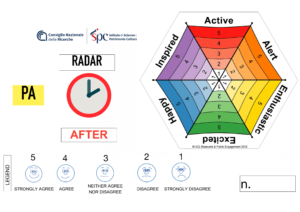
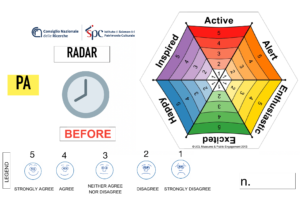
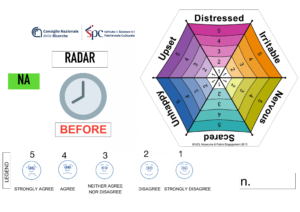
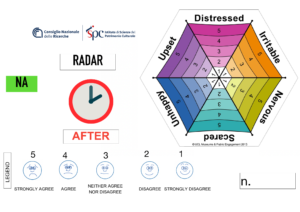
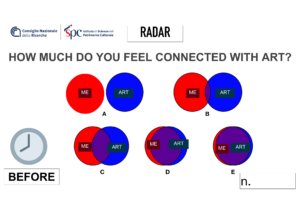
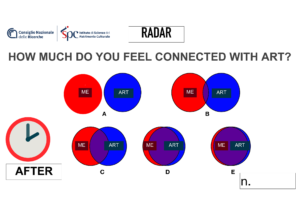
The tools in the RADAR toolkit are quick to compile and can be filled in directly by the cultural user, or alternatively, a facilitator can guide the person who took part in the experience in filling them out. The compilation allows the user to become aware of the changes that have emerged following the visit or the creative and cultural experience. The data can also be used by cultural operators or by educational and social-health professionals to obtain feedback on the impact of the experience.
Fourth newsletter issue
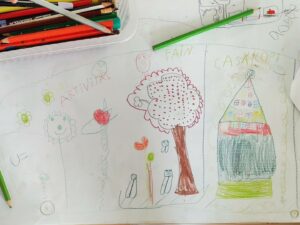
In this issue:
A preview on pilot actions
Field visit in Cluj-Napoca (Romania)
Interviews from Cluj
Last field visit in Budapest (Hungary)
A new Culture&Health project in the Marche region: ImproLANDS
READ HERE the fourth PerFare's newsletter issue
A new phase has started: the first two pilot actions promoting welfare and social inclusion through the arts
Flourishing from the capacity building programme, 8 are the artistic interventions that will take place in health and care venues in Hungary, Italy, Portugal, Romania and Sweden.
From May 2024 to May 2025, artists that have won the call to action will be working together with patients and healthcare professionals.
The first two to open the pilot action phase have been "Aqui Contigo - Sound as Last Lap" in Pombal (Portugal) and "Critical thinking & citizen's education for children and teenagers" in Cluj-Napoca (Romania).
Let's see them up close:
Aqui Contigo - Sound as Last Lap
Aqui Contigo is a project created by SAMP - Sociedade Artística Musical dos Pousos, a Public Utility Institution founded in 1873 which played an important role at regional, national and international level, whether due to the significant number of professional artists that have emerged from it or due to the innovation and quality of some of its programs and projects. Among all SAMP activity, its Artistic Education project dedicated to early childhood stands out, especially the strong social intervention of its programs developing within the scope of the therapeutic effects of the Arts.
In this sense, the project Aqui Contigo was born in 2015, being a program dedicated to people at the end of their lives and their families and caregivers. In a society that often abandons and forgets those who are dying, it is necessary to create contexts that enrich this precious and unique experience for the person and their closest circle of relationships. The Arts, as observed throughout human history, can play a vital role here, as the short history of this SAMP project demonstrates.
After years of experience, SAMP decided to present this type of project for the Municipality of Pombal, welfare partner of the PerFare partner Artemrede.
Intervention model
The Music Therapist intends, with family members and caregivers, to facilitate family support in the painful process and help in the grieving process.
During the last moments of life, in their homes or in institutions (hospitals, nursing homes or palliative care units), two music professionals work together with families to tell the sound story of each person in their terminal phase. This is done through the creation of a personal work that transfors an intimate and lonely moment into a moment of unity and communion, alleviating suffering in the final moments of their life and helping the person to free themselves spiritually.
Critical thinking & citizen's education for children and teenagers
Study visit in Budapest (HU): the last chapter of Perfare's capacity building programme
On 27th and 28th May 2024, the last PerFare's study visit took place in the city of Budapest, hosted by the partner Pro Progressione.
The programme was filled with candid moments of artists and socially-engaged professionals that shared their passionate work towards an inclusive and participative way to implement and promote culture and arts.
Three were the most relevant visits that the partners paid to:
- The project ArtRAVALÓ (“ART FOR TAKEAWAY”), a socio-art project of Subjective Values Foundation and Faktor Terminál Association that from September to May engage young adults (18-24 years) raised in state care in a complete programme aimed at fostering personal development, economic and financial skills, and all practical abilities that are needed to be break the barriers and become an active part of society. Theatre and performing arts are included in the programme as a catalist of motivation ad soft skills development: youths work on a theatre production and drama workshops together, including music and dancing.
„We believe that self-directed creative artistic activity, literature, poetry, music, acting and community experience all help us to understand ourselves and the world around us."
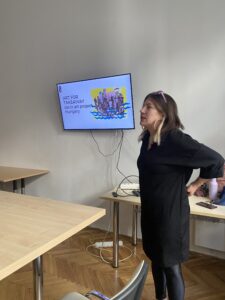
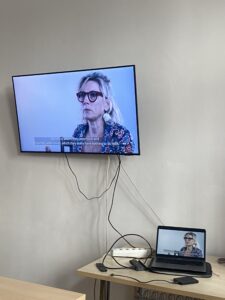
- EMMA Association, a national women’s organization which works for the fundamental rights and societal equality of women, paying special attention to gender-based oppression and violence against women during the childbearing and childrearing period. Specifically, their project MARA has a strong positive outcome: to empower Roma women and assist them through their maternity journey in hospitals, where they often end up in traumatic experiences of carelessness, verbal and physical violence, they trained members of the communities as Community DOULAs. After involving these figures, they noticed that Roma women started trusting giving birth again. Moreover, the community doulas can give support in contraception and abortion.
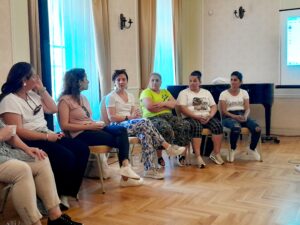
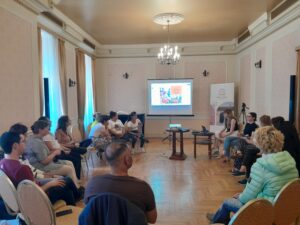
- The MáSzínház community, made up of children and adults with intellectual disabilities and atypical development, volunteer helpers and theatre professionals. In their work, the educational process that precedes the performance is as important as the performance itself.
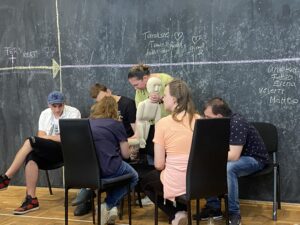
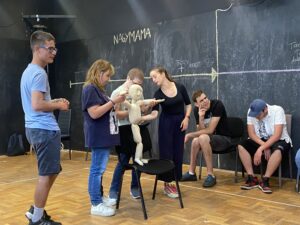
During the Networking Café, the partnership also got the chance to meet associations like:
- Móga Piroska, artistic leader of the project What’SAP - Exchange of Social Art Practices and Community Builders under construction
- Boros Eszter, project manager of Language Café
- Haragonics Sára, participatory movie maker for The Camera as a Social Catalyst
With this last study visit, Perfare's capacity building programme officially ends. Partners have treasured the programme from the very beginning and they are now working towards the implementation of the pilot actions.
More infos on the pilot actions are coming soon!
Keep following us on Facebook, Instagram and Vimeo.
Subscribe to our newsletter to receive all the updates on PERFARE and its journey directly on your emails.
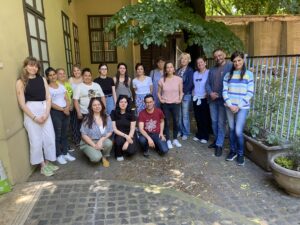
A visit to Romania's social engagement: how arts are employed for the welfare of marginalized groups
On 25th and 26th January 2024, the PerFare partnership participated in the fourth project field visit, hosted by AltArt Foundation in the beautiful city of Cluj-Napoca, unofficial capital of the Transylvania Region in Romania.
Behind the lively university life and rich history, persistently felt all around the city, lies a capillary cultural scene that is strongly focused on the social benefit of each and every people.
Roma people: a long forgotten community
In particular, rights for Roma people are often addressed. Associations like Social Fiber, Shoshin Theatre and AltArt itself have implemented or currently have ongoing projects aimed at the improvement of the severe discriminating conditions that Roma people face on a daily basis.
The CMA - Cluj Metropolitan Area, which comprises Cluj-Napoca and 19 nearby communes: Aiton, Apahida, Baciu, Bonţida, Borșa, Căianu, Chinteni, Ciurila, Cojocna, Feleacu, Floresti, Gilău, Gârbău, Jucu, Petresti de Jos, Săvădisla, Sânpaul, Tureni, Vultureni, has worked with the association Desegregare in the amazing Pata-Cluj project, followed by Pata 2.0, relocating Roma people from the Pata Rât area in new apartments in the city centre, with the aim to give back the right for a future back to the community.
From 2014, the Desegregare association has joined forces with other local stakeholders to fight for the rights of this millennial community, also engaging in cultural activities such as art and music for the Pata Rât children and teenagers, together with Social Fiber and AltArt Fundatia.
The theatre company REACTOR, born in 2014 and active in the social theatre field thanks to specific activities linked to issues among youngsters, also organized a theatre performance in Pata Rât, together with AltArt, in 2016.
Within all the actions activated in the area, the Khetane Festival is a worth mentioning best practice that brought - for the first time ever - around 700 people from the city into the Pata Rât community thanks to its incredible programme.
Practices for youths and elderly
The social vein of Cluj-Napoca is also visible when it comes to initiatives for youngsters and elderly people.
For instance, the FRCC - Romanian Foundation for Children, Community and Family is a day care institution located in the city centre, supported by UK funds and private funds, where teenagers in poverty and/or with psychological disorders can meet after school to be followed by a team of psychologists, educators, teachers and social animators. During their stay, which is determined according to one or more "interventions" lasting 6 months, guests are supported with school activities and engage in extracurricular activities, where arts such as painting, handwriting and music are explored (also in view of discovering each kid's vocation).
As for the elderly, DASM collaborates with the City Municipality and other associations to provide consistent care for elderly. It consists of 2 day care centers where they use art as a tool to improve aging conditions. Their guests paint, make music, sing, dance, organise shows and even participated in an Erasmus+ project where a group of 15 people travelled in Europe attending museums, in order to improve their skills in digitalisation.
DASM is also involved in a plan for building a cultural centre in Pata Rât that will provide sport and cultural activities, along with services like washing machines and psychological and social assistance.
The good practices existing in Cluj-Napoca are definitely too many to list in one go.
Explore the links to know more about each reality introduced.
And now, just enjoy some pictures from the study visit:
Also, keep following us on Facebook, Instagram and Vimeo.
Subscribe to our newsletter to receive all the updates on PERFARE and its journey directly on your emails.
Connecting locally: all the Culture and Health collaborations established thanks to PERFARE
During the first project period, the PERFARE partnership has connected with the local welfare stakeholders to find their "perfect match" to collaborate with in the creation of the local synergies that will generate the PERFARE pilot actions.
From 1 to up to 4 local connections, each partner has successfully found a welfare organization willing to experiment with artistic interventions in their daily work and to investigate the beneficial "contamination" of Culture&Health practices.
Every connection will result into one artistic intervention, which will be selected among the proposals received via the CALL FOR ACTION launched on 14th September and closing on 17th November 2023.
ITALY
Consorzio Marche Spettacolo is collaborating with Associazione Piombini Sensini (located in Macerata) and with Associazione Un Battito di Ali (located in Jesi and operating in the Ancona Torrette Hospital).
Associazione Piombini Sensini's services are aimed at minors and adults who experience situations of personal or family difficulty, social marginalization and psychophysical suffering. The Association's activities are aimed at improving the quality of life and developing the autonomy of the weakest and most disadvantaged people; the provision of various services is a response to the personal and relational needs of daily life, allowing the valorization of rights and resources of each individual.
Associazione Un Battito di Ali is a secular and independent association with the aim of promoting and supporting projects and initiatives of the SOD Cardiac Surgery and Pediatric and Congenital Cardiology c/o Ospedali Riuniti of Ancona.
Thus, for Italy, 2 local artistic interventions will be developed.
PORTUGAL
As a network of municipalities, Artemrede has connected the Municipality of Pombal and the Municipality of Lisbon with 4 realities operating in the welfare system.
The Municipality of Pombal will be supporting one artistic intervention together with Leiria Hospital Center - District Hospital of Pombal.
The Municipality of Lisbon will be collaborating with Alzheimer Portugal (Private Social Solidarity Institution and Patients’ Association), Boa Vizinhança Santo António (Cultural Solidarity Network between Neighbors) and Centro Social Paroquial de São Jorge de Arroios (Non-profit Private Institution of Social Solidarity), bringing 3 artistic interventions to life in Lisbon and its surroundings.
ROMANIA
The AltArt Foundation will be supporting the creation of one artistic intervention together with Fundația Română pentru Copii - Comunitate și Familie, one of the most important non-governmental organizations focused on child protection in Romania, helping children that are living in poverty and providing support to their families and communities.
HUNGARY
ProProgressione chose to collaborate with EMMA Közhasznú Egyesület and Vázsonyi Vilmos Idősek Otthona to develop 2 artistic interventions in Hungary.
The EMMA Association is a national women’s organization, which works for the fundamental rights and societal equality of women, paying special attention to gender-based oppression and violence against women during the childbearing and childrearing period.
Vázsonyi Vilmos Idősek Otthona is an elderly home whose main goal is to provide safe, balanced, peaceful living conditions, personalized care and care for all their residents by providing the necessary services.
SWEDEN
Finally, Malmö City Archives have partnered up with the Health, Care and Welfare Department of Malmö to bring the artistic intervention in one or two of the total 38 elderly homes located in the city of Malmö, with a focus on participation, creation and social inclusion.
What will be the selected artistic interventions?
The rounds of selections will end by April 2024. Bear with us to get to know the winners!
Keep following us to get to know the new project coming.
Subscribe to our newsletter to receive the December issue with all updates on PERFARE and its journey.
The calls to action are out!
Are you an artist or cultural operator working in Italy, Hungary, Portugal, Romania or Sweden?
Are you interested in adding a Culture&Care artistic experience into your daily work?
Send us your application!
Select your country and apply.
Check your country-specific eligibility criteria before applying.
CONTEXT
This 5 calls for action, one for each country involved, are launched to fund artistic interventions that involve audience groups composed of the local populations targeted by the project PERFARE.
- This application will remain open until 17th November 2023.
- The selection of the winning proposal will happen between DECEMBER 2023 and APRIL 2024.
- The winning proposal will be implemented between MAY 2024 and MAY 2025.
Arts on Prescription: a growing, Europe-wide practice for people's wellbeing
PERFARE's study visits have been incredibly enlightening when it comes to Culture&Care practices.
The partners had the chance to meet many projects up close, which engage performing arts practices to prevent and alleviate social, mental and physical conditions.
One of the most interesting concepts is that of Arts on Prescription. This practice isn't exactly new on the market, being around since 1994, but it now drawing more and more attention all over Europe.
What is Arts on Prescription?
Arts on Prescription (AOP) is a program where healthcare professionals refer individuals to art workshops to improve psychosocial health. It is part of social prescribing and benefits those with mild to moderate mental health issues.
AOP is a non-medical approach that aids psychophysical recovery and considers social, economic, and environmental factors. It promotes holistic well-being and recognizes the impact of non-biophysical factors on health.
History
The United Kingdom was the pioneer in offering the integration of social and cultural activities alongside therapeutic prescriptions.
Starting in the mid-1990s, general practitioners began incorporating social and cultural elements into their treatment plans.
The first example was the AoP Stockport, launched in 1994, which provided individuals with mild to moderate anxiety or depression the opportunity to engage in various creative activities aimed at improving their mental well-being.
A few European examples
While in the UK most AoP programs are driven by artists, in the Scandinavian model they rely more often on museum and cultural organizations and institutions.
The project promoted by the municipality of Malmö, with the support of the Skåne region, goes in this direction. A typical program is structured over approximately 10 days and offers participants with mental health issues a series of artistic and cultural activities. Groups consist of about 8-12 people and the activities vary from program to program and may include theatre, museum and gallery visits, music and singing, visual arts.
Read more: https://bit.ly/ArtsOnPrescriptionMalmö
In Italy, the practice of directing artistic and cultural programs towards health promotion, disease prevention, and the management of pathological conditions, including degenerative diseases, is gradually gaining ground.
An example is the AOP project located in Emilia-Romagna, where the regional authority, in collaboration with the ATER Foundation, launched Sciroppo di Teatro. This project brings together 153 general practitioners, 236 pharmacies, and a network of 36 theaters and companies specializing in theater for children and young people. The project aims to contribute to the development of cultural welfare policies, particularly focusing on theater for children and families.
Read more: https://bit.ly/SciroppodiTeatroITA
Another example of a recently launched AoP project is the one funded and promoted by the Interreg Baltic Sea region: Arts on Prescription in the Baltic Sea Region.
Local and regional public authorities, in collaboration with cultural institutions, are piloting the program, evaluating its health effects, organizational setup, and economic benefits. The arts on prescription model is then transferred to other cities and regions, supported by an online practitioner's guide and a rent-an-expert program.
Furthermore, the project aims to initiate dialogue with national authorities and health insurance funds to enhance structural support and financing options for arts on prescription.
Read more: https://bit.ly/ArtsOnPrescription-InterregBalticSeaRegion
Like them, Greece is also launching a national AoP programme, which provides for a structure similar to that already developed in the UK and in the Scandinavian region.
Read more: https://bit.ly/CulturalPrescriptionGreece
These are just a few examples of AOP Programs existing Europe-wide. Many more are growing every other day, signaling a message well-received when it comes to WHO studies on the benefit of cultural activities on mental and physical health.
These studies comparing the overall life satisfaction levels of individuals with a vibrant cultural life to those experiencing cultural exclusion reveal a difference of more than ten percentage points in favor of the former. In addition to enhancing mood and life satisfaction, the use of art as a prescribed intervention can breathe life into the cultural sector and, particularly, the performing arts industry.
Article by
Ilaria Ciaroni
Andrea Belegni

